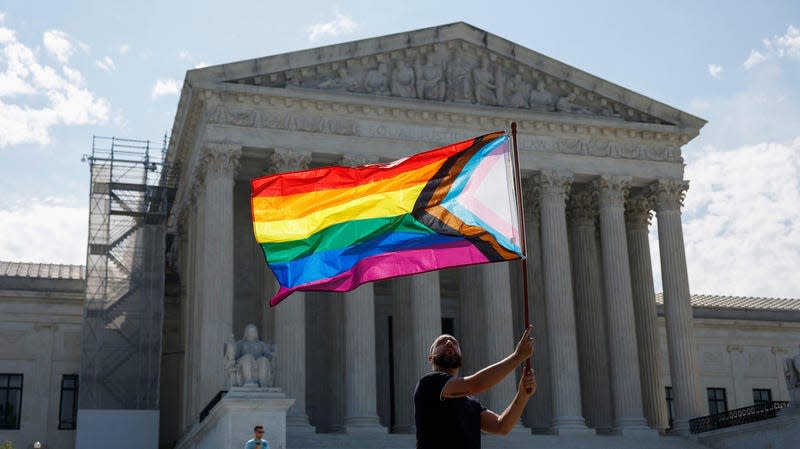Supreme Court Says Yes, Biz Owners Can Discriminate Against Gay People

- Oops!Something went wrong.Please try again later.
The Supreme Court’s latest decision in 303 Creative v. Aubrey Elenis is a continuation of other recent decrees allowing for potentially more discrimination in college admissions.
Time for another round of the Supreme Court’s newest game show: Who Should Be Discriminated Against Next? On Friday, the court decided 6 to 3 in the case of 303 Creative v. Aubrey Elenis, agreeing that the First Amendment protects website designers who choose to discriminate based on their clients’ sexual orientation.
The case centered on a Colorado-based web designer who has proclaimed she did not wish to make wedding sites for gay couples because of her religious beliefs. The decision comes just a day after the court offered decisions that could potentially shield cyberstalkers from prosecution and gut affirmative action in colleges.
Read more
In the majority opinion, Justice Neil Gorsuch wrote: “The First Amendment prohibits Colorado from forcing a website designer to create expressive designs speaking messages with which the designer disagrees.”
In a dissenting opinion, Justice Sonia Sotomayor decried the “heartbreaking” majority opinion for opening up discrimination against a “protected class.” She said that the “backlash to the movement for liberty and equality for gender and sexual minorities” has led to “reactionary exclusion.”
Justice Sotomayor, dissenting: "Today, the Court, for the first time in its history, grants a business open to the public a constitutional right to refuse to serve members of a protected class. ... Our Constitution contains no right to refuse service to a disfavored group." pic.twitter.com/kav5qWcku3
— Mark Joseph Stern (@mjs_DC) June 30, 2023
The case goes back to 2016, when founder of graphic design firm 303 Creative LLC Lorie Smith said she wished to decline to offer any wedding website services to same-sex couples. She and the conservative Christian advocacy group Alliance Defending Freedom sued in federal court against Colorado’s Anti-Discrimination Act. The law prevents businesses from discriminating against patrons or even using any communication that implies certain people are unwelcome based on sex, gender, race, and so on. The Supreme Court agreed to hear the case in September last year.
The thing is, the case has long been controversial because parts of its premise are—well—ludicrous. For one, Smith did not have any messages discriminating against same sex couples on her site at the time she helped file the original lawsuit. Much of the case’s arguments revolved around other, similar litigation from “artists” demanding that they can discriminate against gay couples like the infamous decision in Masterpiece Cakeshop v. Colorado Civil Rights Commission. Reports from inside the courtroom saw justices argue back and forth about First Amendment implications, with conservative justice Samuel Alito making points about similar discrimination based on religion.
The original petition in 303 Creative v. Aubrey Elenis references a gay couple only referred to as Stewart and Mike. According to the doc, the pair contacted Colorado-based web designer Smith in 2016 to help make a website for their wedding and said they “would love some design work for our invites, place-names,” as well as potentially a website.
As The New Republic reported the day before SCOTUS’ decision, the person named Stewart listed in the court docs never sent that inquiry. At the time he supposedly sent it, he had been married to a woman for around a decade. For some reason, the person who was only referred to as Stewart had his name, email, and phone listed on the petition even though he had no real connection to it. He wasn’t even living in the same state as Smith when he supposedly asked for website help.
According to court docs, that inquiry from Stewart was sent just a day after the ADF helped Smith file the suit. The New Republic noted that the inquiry wasn’t included in the original lawsuit, but was only added after defendants tried to get the suit dismissed on the grounds Smith hadn’t suffered any real injury.
In a statement to The Guardian, the ADF called their suit “a pre-enforcement lawsuit, a hallmark of civil rights litigation, because no one should have to wait to be punished before challenging an unjust law.”
The lawsuit was originally dismissed in September 2017, but Smith and the ADF appealed. While the court had cast doubt that Stewart and Mike were by necessity both men, the ADF complained the likelihood they weren’t was “miniscule.” The SCOTUS petition harped on the Stewart inquiry as one of the only real examples of a gay couple seeking a marriage website from Smith.
Even if Stewart was making up his claims, it’s the only example the case used to say that this would indeed be a problem for web designers with certain discriminatory religious views. This case was just an extension of Masterpiece Cakeshop, though with the added intent of enshrining the ability to discriminate services online. Now, despite all that, anti-gay evangelists can publicly proclaim they don’t offer services to gay people online.
This article is part of a developing story. Our writers and editors will be updating this page as new information is released. Please check back again in a few minutes to see the latest updates. Meanwhile, if you want more news coverage, check out our tech, science, or io9 front pages. And you can always see the most recent Gizmodo news stories at gizmodo.com/latest.
More from Gizmodo
Sign up for Gizmodo's Newsletter. For the latest news, Facebook, Twitter and Instagram.

